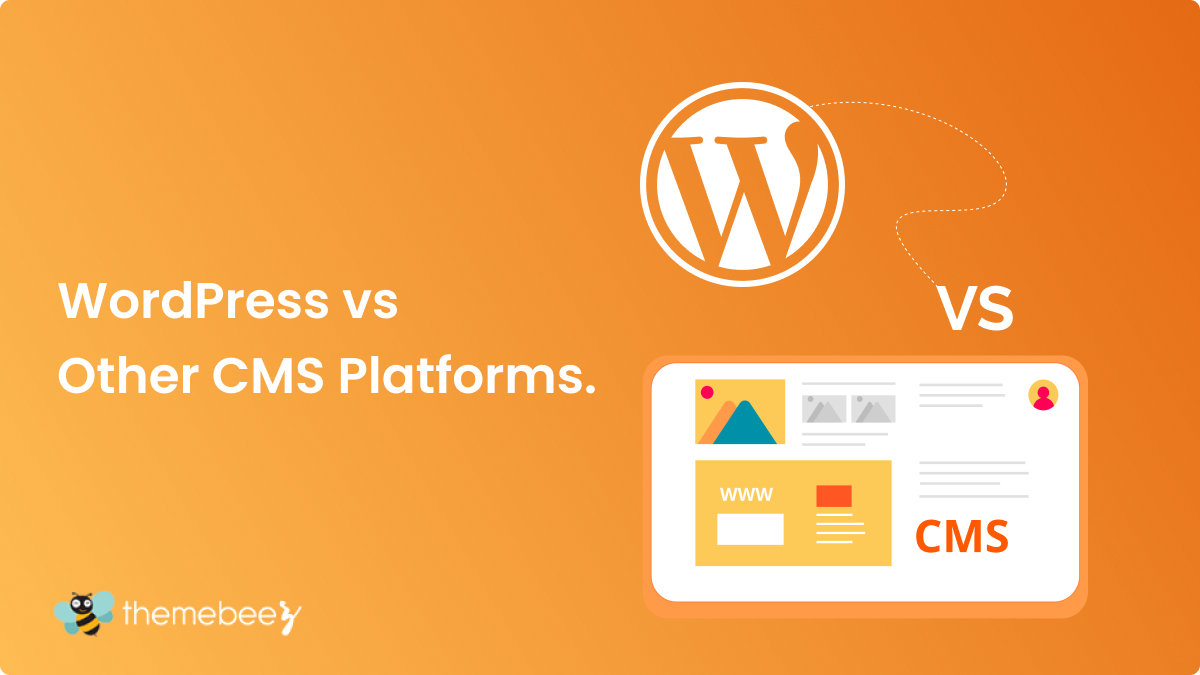When building a website, one of the first decisions you’ll make is choosing a Content Management System (CMS). With so many options available, selecting the one that best fits your needs is essential. WordPress, Joomla, Drupal, and Wix are among the most popular CMS platforms.
This post will compare WordPress with other CMS platforms to help you decide which is the best.
Table of Contents
WordPress vs Other CMS Platforms
1. Ease of Use
- WordPress: Known for its beginner-friendly interface, WordPress is straightforward to set up and manage. Even without technical knowledge, you can install themes, add plugins, and create content with minimal effort.
- Joomla: While offering more flexibility, Joomla’s learning curve is steeper than WordPress. It’s a good option for more tech-savvy users but might be challenging for beginners.
- Drupal: Highly flexible and scalable, Drupal is suited for developers and large-scale projects. However, its complexity makes it difficult for non-developers to navigate.
- Wix: Wix is an easy-to-use website builder with drag-and-drop features ideal for beginners. However, it has fewer customization options than WordPress.
2. Customization and Flexibility
- WordPress: Thanks to a vast library of themes and plugins, WordPress shines in its customization options. You can tailor your website’s design and functionality to meet any requirement, whether running a blog, an eCommerce store, or a portfolio.
- Joomla: Joomla offers more out-of-the-box flexibility than WordPress, but finding the right extensions can be harder due to its smaller plugin ecosystem.
- Drupal: If you need a highly customized website, Drupal offers unmatched flexibility. However, you’ll need coding skills to unlock its full potential.
- Wix: While Wix’s drag-and-drop builder makes customization easy, it lacks the deep customization capabilities that WordPress and other CMS platforms offer.
3. SEO Capabilities
- WordPress: SEO is one of WordPress’s strongest features. With plugins like Rank Math or Yoast SEO, WordPress makes it easy to optimize your site for search engines, even if you’re not an SEO expert.
- Joomla: Joomla offers solid SEO features but requires more manual tweaking. It’s not as beginner-friendly when it comes to SEO settings.
- Drupal: While Drupal is excellent for SEO when properly configured, it requires more technical knowledge to achieve good SEO results compared to WordPress.
- Wix: Wix has improved its SEO features, but it still falls short compared to WordPress, particularly when it comes to in-depth optimization and scalability.
4. Security
- WordPress: As WordPress is widely used, it’s often a target for hackers. However, you can enhance security by using security plugins like Wordfence or Sucuri and following best practices.
- Joomla: Joomla is known for being secure, but just like WordPress, it relies on third-party extensions that might have vulnerabilities.
- Drupal: Drupal has a strong reputation for security, making it ideal for government websites and large organizations. Its complex structure offers robust protection but requires technical skills to maintain.
- Wix: Wix handles security for you, making it a worry-free option for beginners. However, it doesn’t offer as much control over security measures as the self-hosted platforms do.
5. Cost
- WordPress: WordPress is free, but you’ll need to pay for hosting, themes, and plugins. This gives you flexibility in controlling your budget based on your needs.
- Joomla: Like WordPress, Joomla is free but requires hosting themes, and extensions. However, Joomla’s smaller community means fewer free plugins are available.
- Drupal: Drupal is also free, but it often requires developer assistance, which can increase costs significantly.
- Wix: Wix offers free plans with limited features, but its premium plans can be more expensive than WordPress over time, especially if you require more features.
6. Community Support
- WordPress: With a massive global community, WordPress has extensive documentation, forums, and tutorials to help you at every step. It’s easy to find developers and resources if you need assistance.
- Joomla: Joomla has a smaller but still active community. There are helpful resources available, but fewer developers are experienced with Joomla compared to WordPress.
- Drupal: Drupal has a loyal and knowledgeable community, though it’s much smaller. The more technical nature of Drupal can make finding support a bit harder.
- Wix: Wix provides customer support and a growing user community, but it doesn’t have the same vast, developer-driven ecosystem as WordPress.
Conclusion: Which CMS Is Right for You?
WordPress is the clear winner for most users if you’re looking for a balance between ease of use, customization, SEO capabilities, and affordability. It’s beginner-friendly yet scalable, making it suitable for many websites.
However, Joomla might be a good option if you need a platform with more flexibility and don’t mind a steeper learning curve. For large, complex websites that require a high level of customization and security, Drupal is a solid choice—provided you have developer support. Lastly, if you want an all-in-one, hassle-free solution with minimal setup, Wix may be ideal, although it lacks the scalability and flexibility of WordPress.
Ultimately, the best CMS for you depends on your needs, budget, and technical skills. WordPress offers the best balance and powers over 40% of websites worldwide.
We have compared WordPress with both Ghost and Wix. For more detail on the comparison, please read the articles below:
We hope WordPress vs Other CMS platforms has been informative to you. Please share your thoughts and experiences on the mentioned CMS or any other CMS in the comment section below.
Thank you for reading till the end.
